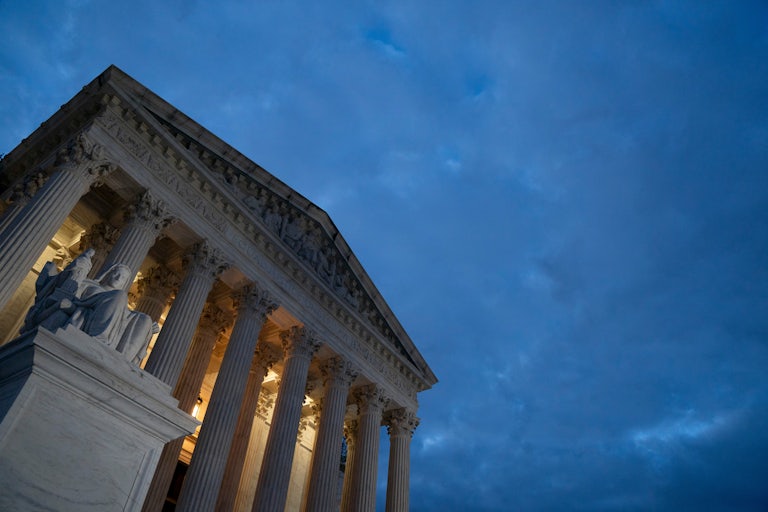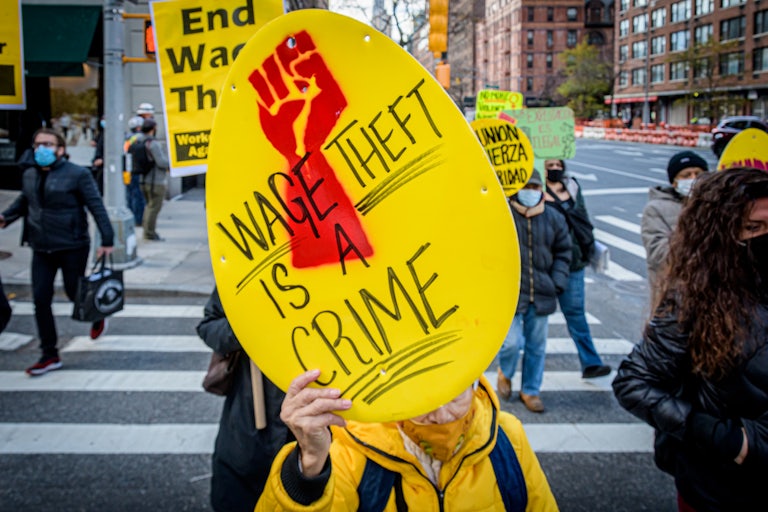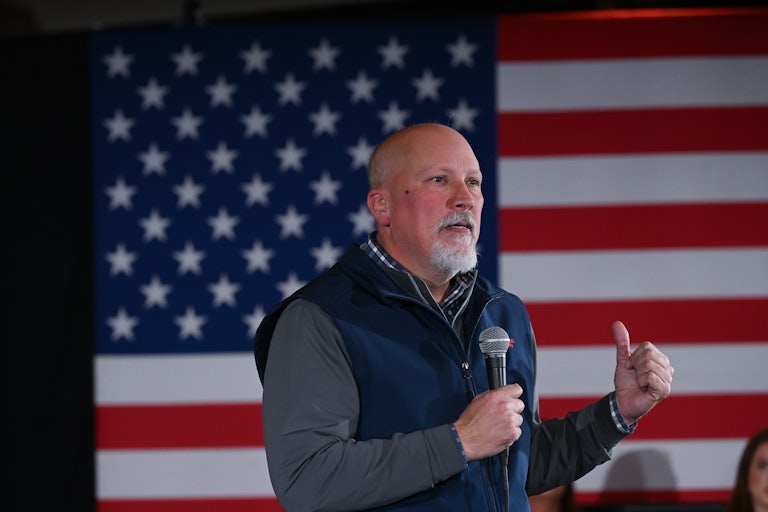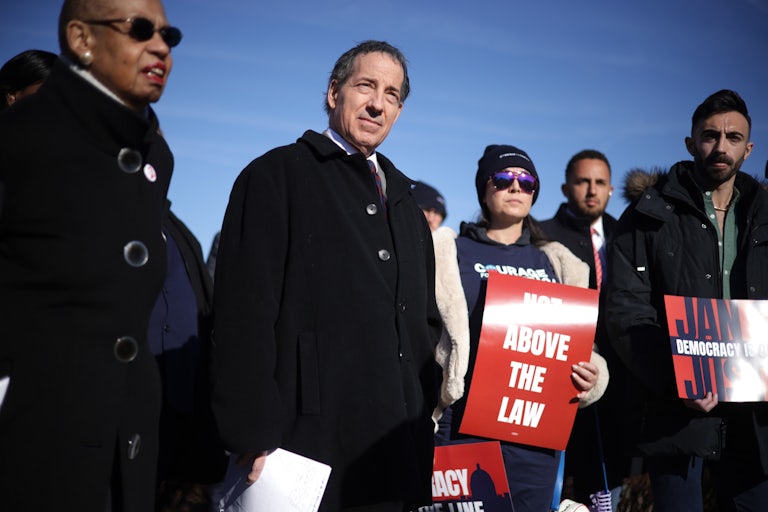The Supreme Court’s Savage Indictment of the Republican Party
If you read the high court’s disqualification ruling closely, you’ll see that the justices unanimously agree that the GOP is a lawless institution.

Our little experiment in multiracial democracy rarely leaves an encounter with the Supreme Court unscathed, but Monday’s 9–0 decision in Trump v. Anderson—in which the justices ruled that Colorado could not keep Donald Trump off the ballot—has left a deeper wound than most. As The New Republic’s Matt Ford explained soon after the unanimous, unsigned per curiam decision was handed down, the ruling is an absolute cock-up that willfully misinterpreted the plain text of the Fourteenth Amendment, seemed to misunderstand how either the Constitution or most elections in the United States work, took up questions that hadn’t been brought before the court in the first place, and found terrible ways to answer them.
The American people began the day armed with a constitutional fail-safe that provided them with the means of keeping an insurrectionist off the ballot. By noon, the court had ruled that they weren’t entitled to that tool, that it would be up to the voters themselves to decide whether an insurrectionist can hold higher office, and that their decision was subject to review and reversal in the form of a subsequent insurrection. Seems like a bad way to run a country.
As far as the legal matters in play are concerned, the ruling is, for the lack of a more polite descriptor, hot garbage—a sentiment, as Ford documented, shared by many people, including those who actually believed Trump should remain on the ballot. But outside of the jurisprudential hash left steaming on the courthouse steps, there is a rather savage truth sitting there, sub rosa, in the decision: It seems the Roberts court unanimously agrees that the Republican Party is truly, and despicably, lawless.
“How could the court butcher the ruling so badly?” asked Ford. “The simplest answer appears to be fear.” Fear was especially apparent in Justice Amy Coney Barrett’s admonition of the liberal trio’s fiery concurrence. “The Court has settled a politically charged issue in the volatile season of a Presidential election,” she wrote. “Particularly in this circumstance, writings on the Court should turn the national temperature down, not up.” It’s a bit rich coming from one of the justices whose rulings, most notably on the abortion rights front, have done a great deal to elevate that “national temperature,” and sow considerable chaos along the way.
But as New Republic contributor Jess Coleman quipped, “Things definitely tend to get messy when a political party unequivocally chooses an insurrectionist as its nominee.” It’s on this precise front that the court curiously avoided taking an obvious escape hatch: disputing that Trump had, in fact, aided an insurrection. Trump’s legal team provided that off-ramp, arguing that the former president was innocent of such treachery. Still, as Ford told me, most of the constitutional arguments that Trump’s lawyers advanced in his defense “only apply if, all other things being equal, he did participate in an insurrection.” That the Supreme Court chose to try to resolve the matter along constitutional lines suggests an admission: They believe Trump to have done the very thing that the Fourteenth Amendment forbids. From there, their mission became to backfill a rationale in support of the notion that Colorado’s remedy would cause too much pandemonium if it were to be administered.
But as they put themselves to this task, the court continued to quietly snitch out the GOP for their misrule. At one point, the court warns in its unsigned opinion of an “evolving electoral map” that could “dramatically change the behavior of voters, parties, and states across the country, in different ways and at different times,” potentially leading to the nullification of the people’s will. Here, Ford said, the court was “essentially caving to threats”—chief among them the ones raised in amicus briefs from a “coalition of Republican-led states” that darkly hinted at the possibility that “some states might exclude other presidential candidates from the ballot if Trump were disqualified.”
Naturally, it’s hard to see why anyone should fear a Republican secretary of state citing the Fourteenth Amendment in an effort to remove a Democratic candidate who had participated in an insurrection. I daresay that I am 100 percent in favor of such Democrats being barred from higher office. Here, however, the justices seem to be implying that the GOP will have reckless disregard for the law, and kick off candidates who cannot be said to have contributed to the sort of crimes that the Fourteenth Amendment inveighs against.
Indeed, we can foreclose the possibility of Democrats abusing their power in this fashion. For starters, at least one Republican secretary of state, Jay Ashcroft, had already issued such a threat, the cited reason simply being that he was upset that Colorado and Maine had moved to keep Trump off the ballot. Meanwhile, there is no such behavior among Democrats: Nikki Haley, a more fearsome opponent for President Joe Biden, was left on the ballot, untroubled by Democratic secretaries of state that might have wanted to help the Democratic candidate. (Also, it wasn’t Democrats who sent amicus briefs to the court written in the spirit of “Nice democracy you’ve got here, be a shame if anything happened to it.”)
It’s understandable that the Supreme Court would be worried about a Republican Party that doubles as a criminal cartel, because we’ve seen how, in the Trump era, they have descended into that lowly state, with one of their chief exports being the fomenting of political violence. This fact happened to be on the mind of Colorado Secretary of State Jenna Griswold as she wrestled with whether or not to invoke the Fourteenth Amendment in the first place: After the Supreme Court ruling was handed down, Griswold gave an interview on cable news where she lamented how the insurrection to which she was trying to respond hasn’t actually ended, as threats to her state election officials keep pouring in.
“We have had 38 percent of our county clerks step down since 2020,” Griswold said. “We can’t allow people who would use intimidation or threats to win that battle.” From the Supreme Court came the reply: If you don’t allow those people to win, the Republican Party might very well hurt you next.
This article first appeared in Power Mad, a weekly TNR newsletter authored by deputy editor Jason Linkins. Sign up here.









